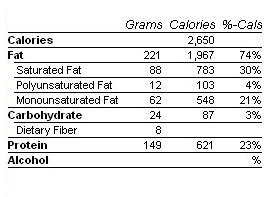Tom Naughton, writer, producer and star of the movie "Fat Head" wrote a blog post about the documentary "The Alzheimer's Project" and shares his feelings about his father, who has AD.
From Tom:
I’ve read quite a bit about Alzheimer’s in the past year, and I know
now that my dad was a walking bundle of risk factors. His mother died
of the disease, although she was in her mid-eighties, not early
seventies. He took Lipitor for 20 years. Despite being touted as
wonder drug that may even help with Alzheimer’s, the truth is that
memory problems are a known side-effect of statins. Dr. Duane Graveline,
a former NASA astronaut, suffered bouts of extreme confusion and memory
loss until he identified Lipitor as the culprit and stopped taking it.
(And by the way, Dad still ended up with stents put in his arteries,
which were 98 percent blocked. So much for the wonders of statins.)
Dad was also a heavy smoker until he quit at age 58 – and then, like
many people who give up nicotine, he developed a fondness for sweets and
starches. He gained a lot of weight. He suffered from sleep apnea.
He showed all the signs of someone developing insulin resistance.
Which brings me back to The Alzheimer’s Project. In one episode,
they named insulin resistance as a major risk factor. Diabetics are
four times more likely to develop the disease, and people who are
insulin-resistant are at three times the usual risk. Many doctors are
now referring to Alzheimer’s as Type III Diabetes.
To read his full post, click here.
Regain Your Brain/Awakening From Alzheimer's
-
Another opportunity to watch this FREE 12-day online series. Received
great reviews - a great resource on the aging brain and lifestyle changes
you can i...
6 years ago










